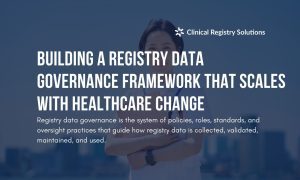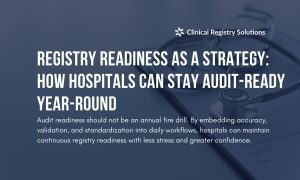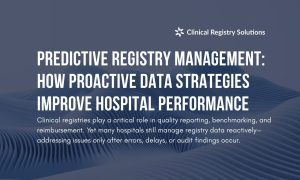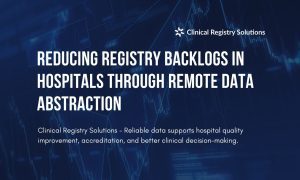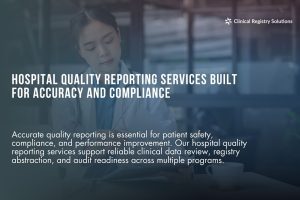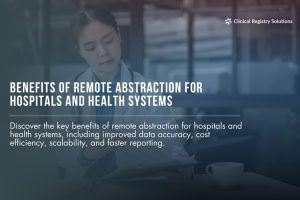You may have wondered how hospitals and doctors track the success of bariatric surgeries. You may wonder: “How can I be sure that my weight loss surgery is safe?” If you, or someone you care about, is considering weight-loss surgical procedures. Are you getting the best possible care? These are essential questions.
Bariatric surgery involves more than simply losing weight. It is a step towards better health and a healthier life. To monitor surgeries and results, hospitals use bariatric surgery registry systems. These registries ensure that you receive better care and safer treatment over time.
This article will explain what bariatric surgical registries are and why they’re essential for bariatric quality reporting. It also explains how programs such as the MBSAQIP registry reports help improve patient safety.
What is a Bariatric Surgery Registry (BSR)?
A bariatric registry is an essential tool for collecting information on every bariatric procedure performed in a surgical center or hospital. Imagine a giant notebook that contains information about the surgery, recovery, and health of each patient.
Hospitals use this notebook to track things like:
- What weight do patients lose after surgery?
- If there are any complications, such as infections or blood clots
- How long do they stay in the hospital?
- You may need to return for further treatment
- The health of patients months and even years after surgery
The information provided is not just a collection of numbers. This information tells us how hospitals are performing and what they can do to improve. It is the only way hospitals can know if they’re doing a good or bad job.
Why is bariatric surgery quality reporting vital to you?
It is essential to collect data because it improves the chances of having a successful operation and keeps you safe.
You can benefit directly from quality reporting:
- Improved health outcomes: Hospitals can improve the results of their surgery by analyzing their own data. They will be able to find out how patients can lose weight more quickly and prevent problems following surgery.
- Early detection of risks is possible by tracking surgery results. The hospitals can then improve safety in order to protect you.
- Confidence and trust: A hospital that shares its quality reports shows it cares about your safety. They are doing everything they can to ensure you’re safe.
Hospitals can learn from each surgery by using bariatric surgical quality reporting. They don’t simply perform the surgery, then move on. They are constantly improving their work and providing better care.
What is the MBSAQIP Registry reporting?
MBSAQIP is a term you may have heard before. Metabolic and Bariatric Surgery Quality Improvement Program is the acronym. It is one of the best programs in the nation that ensures bariatric centers meet high standards.
MBSAQIP registry reports mean that hospitals send their patient information to this program. Experts then review the data and provide feedback. In this way, hospitals are able to:
- Compare their results to other centers
- Expert advice on improving care
- Follow the rules to ensure that your surgeries are safe and consistent
MBSAQIP accreditation is a sign that the center you select adheres to high standards of safety. This is a sign of a hospital that cares about the safety metrics for bariatric surgeries and your health in the long term.
How can clinical data help bariatric surgery programs?
The collection of clinical data is essential to progressing in the care. These data include information about the health of patients before surgery, and their response afterward.
Hospitals use these data to:
- Seize any problems or patterns quickly before they worsen
- After surgery, you can stay healthy with better follow-up care.
- Share best practices when one team’s success helps others.
Hospitals would not be able to know how to treat you best or prevent complications without this detailed information. This data helps to make your care safer and better.
What do bariatric surgery patient safety metrics tell you?
The patient safety metrics are similar to the checklists that hospitals use to determine if all is well. These include measures such as:
- How everyday are emergencies during or after surgery?
- How many patients will need to stay in the hospital longer than expected
- How many patients should be readmitted soon after surgery?
Hospitals can take action quickly if they notice something is not right. You’ll have fewer surprises and a better surgery experience.
Why are long-term outcomes important?
The surgery is only the beginning. After leaving the hospital, your health journey will continue. Bariatric registries continue to track your data even after you have had surgery. They follow you for many months, if not years.
The long-term tracking shows you how the surgery has helped you lose weight and improve conditions such as diabetes or high blood pressure. This tracker also shows how your quality changes.
This helps your doctor provide you with the best care, advice, and support to fit into your new lifestyle. This helps hospitals to learn about what works.
What are MBSAQIP Abstraction Services
The hospitals don’t rely solely on memory or guesswork to collect data. Experts carefully review patient records. Data abstraction is the name of this process.
MBSAQIP Abstraction Service can help hospitals with this task, especially when they have a large number of patients. These professionals ensure that data is accurate and complete.
They also make sure it matches registry standards.
It is essential to have accurate data so that your hospital’s reports on quality are helpful and trustworthy. It is essential to keep hospitals accredited and ensure your safety.
What This Means for You as a Patient
If hospitals use detailed data and registry programs, they can:
- Your surgery center meets safety standards
- The methods used to treat you have been tried and tested by professionals
- As your care is monitored and improved, future surgeries will be even safer.
You can be confident that someone will watch out for you after surgery.
Common Questions You May Have
Do these registries protect my privacy rights?
Your personal information will be kept confidential. The data shared in registries cannot be linked to an individual.
Can registries ensure that my surgery is risk-free?
There are risks in every surgery. Registries can help hospitals identify risks earlier and minimize common problems, making your surgery safer.
What happens if a facility does not report quality?
Not all hospitals have MBSAQIP or registries. Selecting a center with this capability can improve your chances for a safe and successful surgery.
Get more information from trusted experts.
See this study by the National Institutes of Health to better understand how bariatric registry data can improve patient care in the United States: Bariatric Registry Study.
Final Thoughts
It is a significant decision to choose weight loss surgery. You want to be sure that your hospital is going to keep you safe and will help you achieve the best possible results. The bariatric surgery registry makes this possible. The registries turn clinical data from everyday into improvements in care.
Hospitals can use bariatric surgical quality reporting programs, such as the MBSAQIP registry, to track bariatric patient safety metrics. They can also use the clinical data to improve bariatric programs and make them safer.
Clinical Registry Solutions‘ Abstraction Services can help you stay up to date with your reporting if you are interested in learning more about the impact of data on bariatric surgery. Your safety and success are the most important things.
FAQ Section
What is bariatric surgical quality reporting?
This is the method hospitals use to track and analyze bariatric surgery data to improve patient safety and care quality.
What is the impact of MBSAQIP Registry Reporting on Patients?
It helps hospitals to meet strict guidelines, which lead to safer surgery and better results over the long term.
Why are clinical data so crucial for bariatric programs?
The data collected by hospitals helps them improve the treatment they offer to patients.
Can patient safety metrics reduce surgery risks?
Hospitals can reduce complications and risks by monitoring safety metrics.
